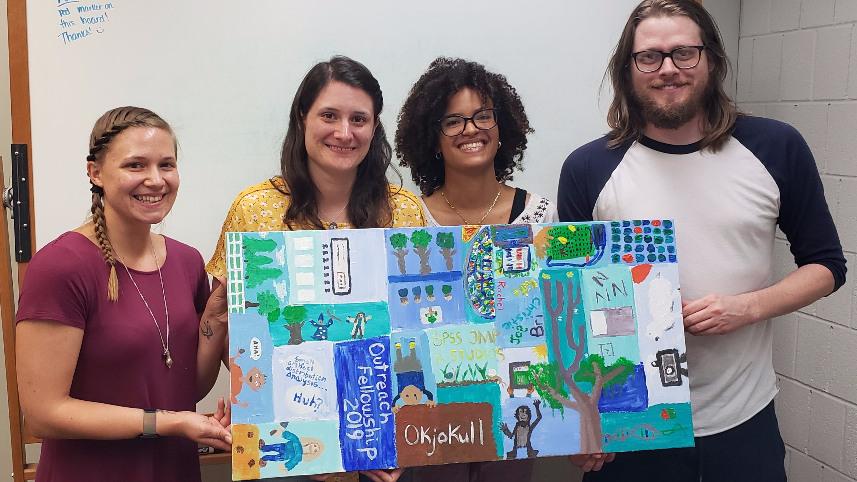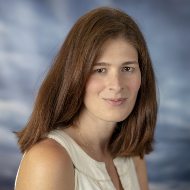When NCSE’s second cohort Graduate Student Outreach Fellows started in August 2019, they had a pretty solid roadmap for understanding what their year would be like. Like our first cohort, Joe Jalinsky, Rachel Larson, Briante Najev, and Christie Vogler would spend most of the fall learning outreach theory, before tackling grants, science writing, and research in the spring and developing and testing a final project based on their own research in the summer. As you might imagine, however, doing science outreach in the middle of a pandemic can be difficult. Since early March 2020, the safety concerns of in-person events have led the Fellows to see their best-laid plans for community engagement go out the window.
What happened next was true ingenuity. Fellows responded by creating online experiences, developing apps, and focusing on using technology tools to train the next generation of science communicators. Our in-class sessions shifted to address theoretical approaches that complemented the practical learning that had occurred earlier in the fall. We also focused on developing and honing skills in programming and writing. The Fellows should be commended for their flexibility, innovation, and their dedication to providing access to inquiry-based science even in the face of extremely difficult circumstances.
On August 3, 2020, this second cohort of Fellows met for their final presentations with NCSE staff, their principal investigators, and members of their funding agencies. Below are just some of this cohort’s accomplishments during the year:
Joe Jalinsky, a graduate student in biology at the University of Iowa, has been associated with NCSE outreach throughout eastern Iowa for five years. On the basis of his observations while doing evolution activities in his community, he grew worried that many people think of evolution and natural selection as synonymous. As a result, for his final project, he developed an activity that puts mutation, drift, and non-random mating on the same playing field as selection. Jalinsky used bridging metaphors of popular carnival and arcade games (such as Skee-Ball) to help participants focus on understanding the mechanisms behind each of these evolutionary processes. Though he has not gotten to test the activity with the public yet, Jalinsky is teaching an evolutionary theory course in the fall of 2020 and plans to open the lab section with it. Outside academia, Joe is an accomplished videographer. His talents for science and visual media were brought together in the spring of 2020, when he made multiple science videos for Musser Public Library in Muscatine, Iowa, a local library that was unable to host regular science programming.
Rachel Larson is a graduate student in geography at the University of Iowa, where she studies human interactions with urban wildlife. It is no surprise, then, that one of the themes that echoes through her work is the importance of connecting people with the natural world located in their backyard. She explored how to integrate best practices of project-based learning into science outreach, ultimately creating an app called “Bye Bye Birdie” that lets people explore how climate change affects the range and diversity of charismatic local species. In the summer of 2020, Larson received a $3500 grant from the Iowa Department of Natural Resources Conservation Education Program; she will use the funds to develop an outreach game called Concrete Jungle: An Urban Wildlife Board Game. This game will let players take on the role of various wildlife species as they navigate a complex and changing urban landscape. She hopes to make the game freely available to her collaborative network, including Iowa teachers, universities, government organizations, and non-profits like zoos and the Urban Wildlife Information Network (UWIN).
Briante Najev is working on her doctorate in biology at the University of Iowa. Her goal is to create experiences that integrate genetics, behavior, and ecology to develop nuanced understandings of evolution. Her final project, a game called Of Mice and Dice, uses Hopi Hoekstra’s work on the evolution of mice to challenge players to think about how selection acts on both genotype and phenotype. Najev was awarded a grant from the British Ecological Society that originally supported research on face-to-face engagement techniques using the NCSE activity EcoStax. Once the pandemic began, Najev pivoted and worked with local libraries to create a series of livestreams using the activity. She also created dozens of EcoStax copies so families could safely and freely play along during the livestreams. True to the spirit of NCSE’s Breaking Down Barriers Program, Najev also used her Theory to Practice project to research underrepresentation in citizen science and explore how to increase diverse participation in citizen science ecology projects.
Christie Vogler’s approach to science outreach was greatly influenced by her time working at the Iowa Children’s Museum. From modifying NCSE’s kNow Your Nitrates activity for younger visitors for her Climate Change in My Community project to her research project on the importance of play, Vogler has tried to deliver and develop experiences that stay true to the principles of inquiry-based learning. For her final project, Vogler wanted to show how evidence affects understanding in her own field of study, archaeology. She therefore developed a ghost town scenario, where amateur archaeologists uncover various types of environmental archaeology data to understand what happened to this abandoned city while getting their hands dirty and using real archaeological techniques. Vogler successfully defended her dissertation this summer and began as an Assistant Professor of History at the University of Lynchburg.
You can access many of the fellows’ final projects, as well as their apps and Climate Change in My Community projects, on NCSE's Breaking Down Barriers resources page.
NCSE was excited to be able to work with these Fellows and thanks the University of Iowa Graduate Challenge Grant and the Carver Foundation for their support of the Fellows’ community engagement.


